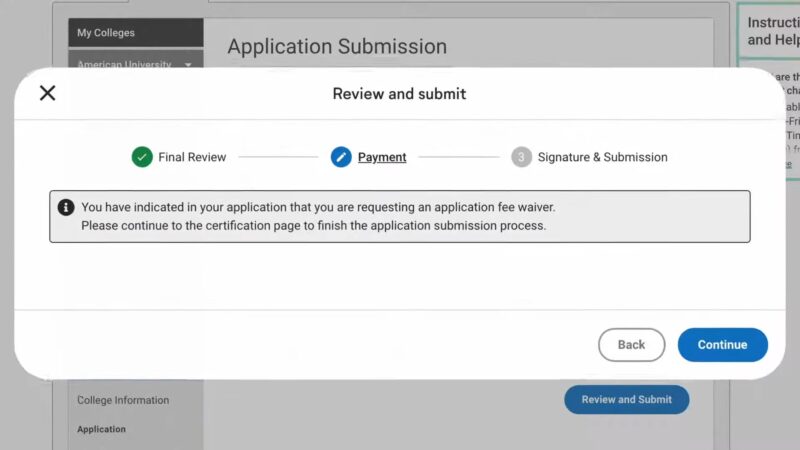The Common Application, a pathway to over 900 colleges and universities, can be a turning point in your educational journey. However, navigating this platform requires careful planning and understanding.
With this article, I want to simplify this process for you and offer you 10 essential tips to help you master the Common Application.
1. Start Early

Time is a crucial factor. Begin well before deadlines to avoid last-minute stress.
- Familiarize yourself with the application components and gather necessary documents like transcripts and recommendation letters early.
- Use this time to understand the application’s layout and requirements.
- Research essay topics and begin brainstorming ideas.
Early preparation also allows you ample time to revise and refine your application materials.
2. Understand the Requirements
Each college may have specific requirements. Research the requirements for each college on your list.
Pay attention to essay prompts, supplemental questions, and any additional documents they may need. Ensure you understand the format and length specifications for essays.
Look into the preferred submission methods for documents and recommendations. Meeting the requirements is the first step in making a good impression.
3. Choose Recommenders Wisely
- Select teachers or mentors who know you well and can provide insights into your abilities and character.
- Inform them early and provide details about your goals and the colleges you’re applying to. Choose individuals who have observed you in different capacities – academics, extracurricular activities, or community service.
- Provide them with your resume or a list of achievements to help them write a more comprehensive recommendation.
- Maintain regular communication with them to ensure they meet the submission deadlines.
4. Craft a Compelling Essay
Your essay is your chance to showcase your personality. Write authentically about experiences that shaped you.
Stick to the word limit and seek feedback from teachers or mentors. Focus on creating a strong opening to grab the reader’s attention.
Use vivid, descriptive language to bring your experiences to life. Finally, ensure your essay reflects your voice and perspective, making it unique and memorable.
5. Highlight Extracurricular Activities

Your activities outside the classroom show your interests and skills.
- List activities that demonstrate leadership, commitment, and growth.
- Be specific about your role and achievements in each activity.
- Quantify your impact if possible, like the number of people you led or the amount of funds raised.
- Show how these activities have contributed to your personal growth.
- Avoid listing activities for the sake of quantity; focus on quality and significance.
6. Stay Organized
Keep track of deadlines, requirements, and documents for each college. Create a checklist or use a spreadsheet to stay organized.
This will help ensure you don’t miss any important steps. Set reminders for crucial dates, such as application submissions and scholarship deadlines.
Regularly update your checklist as tasks are completed. Keep copies of all documents and correspondence in a dedicated folder, either digital or physical.
7. Proofread Everything

Errors can detract from your application.
- Step 1: Proofread your essays, activity descriptions, and all other sections.
- Step 2: Ask someone else to review your application for mistakes you might have missed.
- Step 3: Pay special attention to grammar, punctuation, and spelling.
- Step 4: Read your essays aloud to catch awkward phrasings or run-on sentences.
A well-proofread application demonstrates your attention to detail and commitment to presenting your best self.
8. Be Honest and Authentic
Represent yourself truthfully. Admissions officers value authenticity and can often spot exaggeration or dishonesty.
Your genuine story is more compelling than an embellished one. Avoid the temptation to inflate your achievements or responsibilities.
Reflect on your true passions and how they align with your academic and career goals. Authenticity in your application helps you find colleges that are the right fit for your personality and aspirations.
9. Utilize the Additional Information Section
This section allows you to explain circumstances that affected your academic performance, such as illness or family responsibilities. Use it judiciously to provide context, not excuses.
Be concise and factual when describing these circumstances. This section can also be used to highlight achievements or qualifications not covered elsewhere in the application.
Remember, this is not an extension of your essay but a space to provide relevant information that gives a fuller picture of your background.
10. Regularly Check Your Email
Colleges may communicate important information through email. Check your email regularly for updates, additional requests, or interviews.
Set up email alerts or dedicated folders to ensure you don’t miss any communications. Respond promptly to any requests from colleges, such as providing additional information or confirming interview times.
Remember, timely and professional communication reflects your seriousness and interest in the college.
FAQs
![]()
Can I change my essay after submitting my application to one college but before submitting it to others?
No, once you submit your application to a college, you cannot change any part of it, including the essay. If you wish to modify your essay for other colleges, you need to create an alternate version of your Common Application.
How many colleges can I apply to using the Common Application?
You can apply to a maximum of 20 colleges through the Common Application. This allows you to explore a wide range of options while keeping your application process manageable.
Is there a fee for each college I apply to through the Common Application?
Yes, most colleges require an application fee. These fees vary by institution. However, fee waivers are available for eligible students who demonstrate financial need.
Can I apply to colleges that are not part of the Common Application system using this platform?
No, the Common Application can only be used to apply to colleges and universities that are members of the Common Application organization. You must apply separately to institutions not participating in this system.
How do I report my standardized test scores in the Common Application?
You can self-report your test scores in the Testing section of the Common Application. However, most colleges require official score reports sent directly from the testing agencies.
If I take a gap year, will my Common Application information be saved for next year?
Yes, your account information, including your personal details and activities, will be saved. However, you will need to create a new application for the new admission cycle and update any relevant information.
Final Thoughts
Navigating the Common Application can be challenging, but with these tips, you’re equipped to present a strong and compelling application. Always keep in mind that this is a journey to find the right college fit for you.
Be yourself, stay organized, and embrace the process with confidence and enthusiasm. Good luck!
